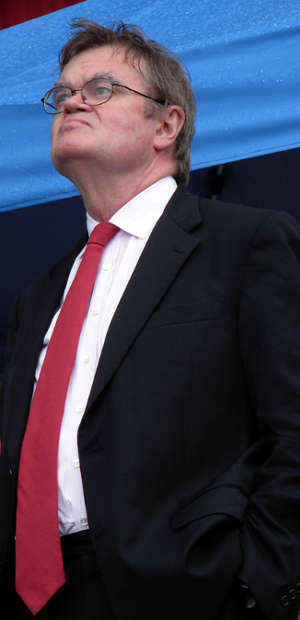Garrison Keillor, host of the popular A Prairie Home Companion weekly radio variety show, displays his cranky side in a recent column posted to Salon.com. In his column titled “Don’t mess with Christmas,” the radio personality and best-selling author takes a swipe at Unitarian Universalists — for changing the lyrics to “Silent Night” — then derides Jewish songwriters, who have penned many of the best-loved Christmas songs.
Here’s a taste:
Unitarians listen to the Inner Voice and so they have no creed that they all stand up and recite in unison, and that’s their perfect right, but it is wrong, wrong, wrong to rewrite “Silent Night.” If you don’t believe Jesus was God, OK, go write your own damn “Silent Night” and leave ours alone. This is spiritual piracy and cultural elitism and we Christians have stood for it long enough. And all those lousy holiday songs by Jewish guys that trash up the malls every year, Rudolph and the chestnuts and the rest of that dreck. Did one of our guys write “Grab your loafers, come along if you wanna, and we’ll blow that shofar for Rosh Hashanah”? No, we didn’t.
Christmas is a Christian holiday — if you’re not in the club, then buzz off. Celebrate Yule instead or dance around in druid robes for the solstice. Go light a big log, go wassailing and falalaing until you fall down, eat figgy pudding until you puke, but don’t mess with the Messiah.
One commenter on Salon.com mentions that he “could take on Keillor’s illogic with a few dozen examples of how those Jew immigrants he seemingly scorns also created a substantial part of the ‘American Songbook.’ But that might be beside the point.” And others are puzzled by Keillor, who has come out as a liberal in recent years, enlisting in the War on Christmas shtick, which has been the province of right-wingers like Bill O’Reilly, Glenn Beck et al.
And the Star Tribune couldn’t resist running Keillor’s piece of holiday jeer.
 Garrison Keillor (Photo: Creative Commons)
Garrison Keillor (Photo: Creative Commons)
Keillor, who is also the proprietor of Common Good Books in St. Paul, seems to be intent on alienating his Jewish fans, with his belittling of Irving Berlin, Johnny Marks, Mel Tormé, and many other Jewish songwriters who achieved religious cross-over fame.
As an antidote to Keillor’s rant, you may want to read Michael Feinstein’s commentary in the New York Times about Jewish songwriters and Christmas. Feinstein, a leading proponent of the American Songbook, writes amusingly about performing a Christmas concert, which the director of a regional symphony orchestra in California deemed to be “too Jewish.”
In his concert the previous night, Feinstein writes, “I had mentioned that almost all the most popular Christmas songs were written by Jews and then riffed on the idea that the Gentiles must have written mostly Hanukkah songs. The audience was enthusiastic, so I assumed it was somebody on the board who had been offended.”
Feinstein delights his audiences with “novel expressions of the season” in song, and he doesn’t care about the tunesmiths’ religious background. “It doesn’t take Freud to figure out that the sugarplums, holly and mistletoe all tap into a sense of comfort, longing, security and peace that so many fervently desire; that we all wish the clichés were true,” Feinstein writes. “As Jews, Christians, Muslims, Mormons, Buddhists and everything in between, we are all more alike than we are different. That’s something to celebrate.”
In contrast to Keillor’s views on musical “dreck” (a Yiddish word!), Feinstein offers a gracious, nuanced look at Jewish composers and their songs about Christmas and its accoutrements. Somehow, Feinstein seems more kind — more Christian. More the mensch. — Mordecai Specktor
***
JCRC weighs in on Keillor brouhaha
Steve Hunegs, executive director of the Jewish Relations Council of Minnesota and the Dakotas, has responded to Garrison Keillor’s column on the Web site of the Star Tribune.
Allowing that “anybody can have a cranky day and spout all sorts of unfortunate remarks,” Hunegs stands up for Jewish songwriters, Unitarians, and for Keillor himself, recalling the humorist’s past good deeds for the Jewish community, including highlighting Holocaust remembrance events.
Hunegs writes: “Mr. Keillor’s Christmas commentary is not the Garrison Keillor whose ‘Writer’s Almanac’ has often featured Jewish writers and/or themes often, movingly, on the Jewish high holy days.”








 Garrison Keillor (Photo: Creative Commons)
Garrison Keillor (Photo: Creative Commons)









